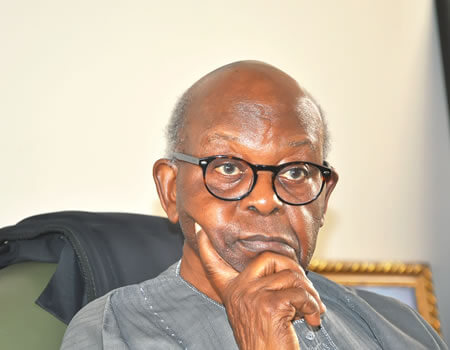HARVESTED in the early hours of Friday aged 91, frontline Afenifere leader, nationalist, legal icon and Knight of John Wesley, Sir Olaniwun Ajayi saw death coming and prepared for it. He had a foreboding that the death’s icy hands would come for him sooner and thus operated with the Latin philosophy, carpe diem (seize the day). A sense of urgency, almost like never before, had descended on him in the last few months. Whenever and wherever opportunity presented itself, he spoke like a newly inspired prophet on a theme he and his coevals had thoroughly and extensively discussed and mobilised people towards achieving: Yoruba unity.
The jeremiad of the nonagenarian, who was Commissioner for Education and later Health in the defunct Western state between 1972 and 1974, particularly on the state of affairs in the Yoruba over the last couple of decades had been: “What will I tell Chief [Obafemi] Awolowo when I meet him? During the Western Region government, he had envisioned where the Yoruba nation would be 50 years from then. What excuse will those of us who witnessed the 50 years give to him on the state of disunity in the Yoruba nation and the lot of the Yoruba in national political life?”
For the first time in decades, hitherto feuding eminent Yoruba leaders had gathered under a common roof to discuss the plight of the Yoruba nation in the context of the Nigerian Project, among other issues. The centripetal event was the 50th remembrance lecture for Adekunle Fajuyi held in Ibadan in July 2016.
During the meeting, it was gathered that Sir Ajayi summoned Mr Dele Alake, one of the lieutenants of Senator Bola Tinubu and former Lagos State commissioner who was the compere for the event, and told Alake he wanted to visit Tinubu. Alake was said to have replied that Tinubu would rather come and see him than for him to stress an elder statesman to come to his house. But the legal icon was said to have replied, “No. If I wait for him to come and see me, it will not be as fast as I want our meeting to be. I am 91; [Chief Reuben] Fasoranti is 90; and [Chief Ayo] Adebanjo is 88. The bell may toll anytime.”
Since a majority of the governors in the South-West region are in the governing All Progressives Congress (APC) and are deemed to have been largely installed by the former Lagos governor, the choice of Tinubu, to the Afenifere leaders, was most appropriate. The meeting was fixed and he met with Tinubu and the governor of Lagos State, Akinwunmi Ambode. Sir Ajayi discussed the need to forge an enduring unityamong Yoruba sons and daughters, irrespective of political or religious affiliations and particularly the political elite, in the interest of the advancement of the people. A further meeting with all the South-West governors was mooted at that meeting.
For Sir Ajayi, the meeting was taking too long to summon and he became worried. He therefore called the Publicity Secretary of the Afenifere, Mr Yinka Odumakin, on Tuesday, to see him quickly. Odumakin said, “I was in Ibadan that day when he called and said he wanted to see me. I went to him and spent about three hours with him. He was worried that, after the meeting held with Tinubu, not much has happened regarding the one we scheduled to hold with the South-West governors.
“I called Alake and Papa Ajayi spoke with him, saying, “…Strategy, e yara a [act fast] asiko nlo, asiko nlo, asiko nlo [time is far spent]. He said this three times. Before then, Alake had told me that Tinubu wanted to return Sir Ajayi’s visit.
“There is a committee set up to go round the Yorubaland and come back to report to him. He provided the bus and the driver to take members of the committee around. All that will have to be put on hold now. It is unfortunate that we lost Papa at this time. We never knew he was bidding us farewell indirectly when he was saying asiko nlo,” Odumakin said.
Ardent campaigner for true federalism, restructuring
The Isara Remo-born elder statesman lived for ideals that he and his peers inherited from the sage, Chief Awolowo, by crusading an equitable Nigeria, a country where life will be abundant for the citizenry; a country where, from the South to the North, the light of qualitative education will illuminate the dark corridors and bring liberty to the bound; and not a country where arrangements are skewed in favour of a segment to the disadvantage of others.
Consistently, he had called for a return to regional arrangement as guaranteed by the 1963 Constitution, to enable regions develop at their own pace. But towards the later part of his life, he had said “Our problems started from not being constructed properly as a federal country. I agree that corruption must go. There is no country in the world where you don’t have corruption, not even in England or the United States. As far back as 1944, they still bribed people for votes in Scotland. The magnitude of corruption in Nigeria is beyond measure. Our basis as a country, our foundation is not proper. Nigeria was built on quicksand and that is why the country may collapse.
“Although we now cannot go back to say states should be created as we wanted in the 50’s, we now have six geo-political zones. So, let us give teeth to those zones. If we do that, there will be peaceful co-existence. When we had the three regions in the 50’s we were making progress. But now we are not making progress. The constitution that was forced down on us makes the president an Emperor.
“If you go to the 1963 Constitution by which we became a Republic, you will find out that the functions of the Federal Government in that constitution were about 60 in number. But go to the 1978 and 1999 Constitutions, the functions have been increased to nearly 70 if not more because it is they who are in charge.
“The principle of federalism is that there should be no government that will be so strong as to control the other parts of the federation. They should be coordinates, that is to say, each of them having its own function. The president dictates to the governors. He shouldn’t because he has no control over the governors. Every governor is under the control of each state House of Assembly. But the president dictates to them. Of course, the governors have to be dictated to because their hands are not clean; their hands are as unclean as their minds.
Report of 2014 confab as solution
To address the problems and ensure the country is founded on a solid base and in accordance with geometrical realities, the frontline leader counseled on the adoption and implementation of the recommendations of the 2014 national confab.“The recommendations are absolutely relevant. The National Assembly should accept the conclusions of confab and as true and honest patriots give institutional effect to the recommendations,” he had said.
Encounter with the Awolowo family
Pa Olaniwun Ajayi, 91, lived for service to humanity and the campaign for a just and equitable Nigeria. He came in contact with Chief Awolowo at a relatively tender age of 21, precisely in 1946, while he was at Wesley College in Ibadan, through one of his friends who lived at a Boys’ quarters in the Awolowo residence at Oke Bola.
“With the passage of time, I was getting to know the Awolowos. Then of course the acquaintance then started to grow and grow till the Acton Group came into being in 1951 and I joined in 1952. At that time, I had left Wesley College and was teaching at Sagamu and I was secretary to various organisations-the Wesley Guild, quarterly meeting of the church and the Boys Brigade.
“So, as the secretary of Wesley Guild, occasionally I would be asked to invite Papa Awolowo to come and lecture us. So, these things made me closer to Chief Awolowo,” he had said.
Sir Ajayi, an author
He qualified as a Chartered Secretary in 1959 and later enrolled for a degree in Law at the London School of Economics and Political Science, following which he was called to the English Bar at Lincoln’s Inn in 1962. In November of the same year, he founded his law firm, Olaniwun Ajayi & Co (now Olaniwun Ajayi LP). One of the leading law firms in the country.
Sir Ajayi has authored of six books between 2005 and 2015. The books are: This House of Oduduwa Must not Fall (2005); Lady Adunola Ajayi in Retrospect (2008); Nigeria: Africa’s Failed Asset (2009); Lest We Forget (A Memoir) 2011; Isara: Afotamodi, My Jerusalem (2011) and Nigeria: Political Power Imbalance-The bane and change down of Nigeria’s progress and development (2015).
In his expansive living room stands on grand piano which he lamented he could not play, however hard he tried to learn it. He however compensated for that with the purchase of a big organ for the Methodist Church of Nigeria, Isara Remo and paid the organist’s salary and the cost of his accommodation.
WATCH TOP VIDEOS FROM NIGERIAN TRIBUNE TV
- Relationship Hangout: Public vs Private Proposals – Which Truly Wins in Love?
- “No” Is a Complete Sentence: Why You Should Stop Feeling Guilty
- Relationship Hangout: Friendship Talk 2025 – How to Be a Good Friend & Big Questions on Friendship
- Police Overpower Armed Robbers in Ibadan After Fierce Struggle






